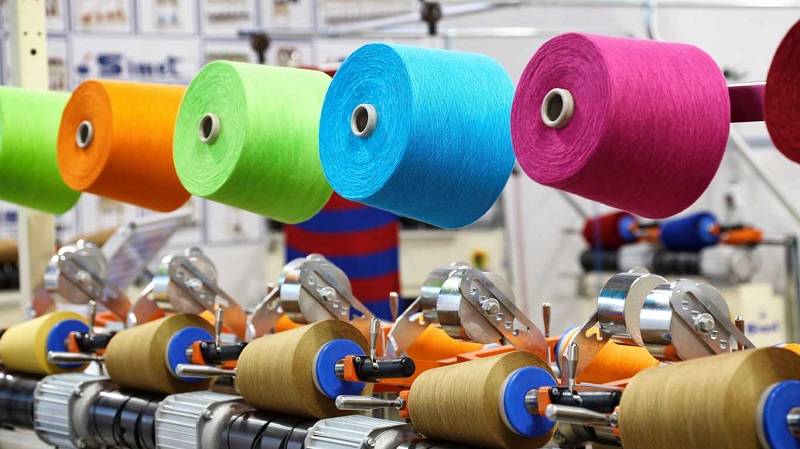The Need for Qualified and Trained Textile Engineers Increases
The textile and ready-to-wear sectors, which create significant momentum in Turkey’s foreign trade, are among the leading sectors in the economic development of our country and in increasing international competitiveness through its production capacity. Textile Engineers, who can adapt to the rapidly changing and constantly developing dynamics of the sector with a technology and innovation-oriented approach, have the opportunity to operate in different fields.
Nejdet Ayaydın, Board Member of Istanbul Ready-to-Wear Clothing and Apparel Exporters’ Association (İHKİB), and İpekyol Ayaydın Miroglio Group Board Member, one of the leading companies in the sector, taking part in local and global markets, comments on the subject as follows: ‘‘Textile engineers undertake one of the most important roles in the fashion retail industry with their basic engineering knowledge, analytical perspective, textile technology, and design knowledge, innovative and visionary perspective. The need for textile engineering will continue to increase as Turkish brands take their place in the local and global markets by growing every year. Textile engineering will play an even more important role in the future for the sustainable fashion industry, which is one of the most important issues in today’s world.’’
‘‘Textile Engineers Will Play a Leading Role in Reaching the Export Targets of the Sector’’
Necat Altın, Member of the Board of Istanbul Textile and Raw Materials Exporters’ Association (İTHİB) and Chairman of Zorlu Holding Textile Group stated the following regarding the topic: ‘‘As a textile engineer, I would like to underline that we need qualified engineers for innovative and sustainable production in the textile industry that shapes the future of Turkey. Our textile engineers, who can implement their ideas with innovative solutions in line with the needs and expectations of the industry, will play a leading role in reaching the export targets of our textile industry. Because the most important investment is investing in human capital. The goal of Turkey, which is already the world’s 5th largest textile exporter, to be in the top 3 and at the same time the vision of making one of the biggest contributions to the perception of the Turkish brand is only possible with qualified textile engineers.’’
Stating that Turkey is constantly increasing its market share in the textile and apparel industry, Varner Global Production Strategy Specialist and Textile Engineer Burak Çeker emphasized the industry’s need for qualified and educated manpower. Çeker continued as follows, ‘‘As a result of the developments in production techniques around the world, serious investments that answer the question of how to produce faster and better, the increase in the number and qualifications of our globalizing dynamic companies, the demand for a well-trained workforce that has arisen in subjects such as sustainability and corporate social responsibility, the need for Textile Engineers has increased even more.’’
Addressing students who will prefer Textile Engineering, Kipaş Tekstil General Manager and Kipaş Holding Board Member Halit Gümüşer indicated the following: ‘‘For a sustainable and cyclical future that adds value to our industry, we include a more qualified workforce in the field of Textile Engineering into economic activities. I advise students who will choose Textile Engineering to be curious about innovation and technological developments and to be open to their own improvements and changes along with the development of the sector. In order to achieve our global goals in technical textiles, which we position as the future of the industry, our need for visionary, world-following, highly qualified textile engineers is inevitable.’’
Jale Tuncel, Vice Chairman of the Board of Istanbul Ready-to-Wear and Apparel Exporters’ Association (İHKİB), who is a graduate of Textile Engineering and has been in the sector professionally for 32 years, stated that engineering education provides students with skills in every field. Tuncel continued as follows: ‘‘In the sector, which has an inherent dynamic structure, I have worked as a manager in procurement, sales, finance, units over the years. With the experience I have gained in all these units, I continue to work in senior management levels that require a holistic perspective. Textile Engineering is an academic discipline that works on subjects such as fiber, yarn, weaving, knitting, non-woven surfaces, ready-made clothing production, and textile finishing.
Education and Employment Opportunities Supported in Textile Engineering
The need for technical knowledge of Textile Engineers continues in parallel with the continuity of the sector. In order for the students to gain the necessary equipment for the profession, students who choose Textile Engineering in the university choices are provided with a minimum wage, internship, and job guarantee within the scope of the ‘‘My Choice is Textile Engineering’’ project.
Under the leadership of Textile and Apparel Exporters’ Associations, the ‘‘My Choice is Textile Engineering’’ project, which was initiated in 2019 in cooperation with the Ready-made Clothing and Apparel Exporters’ Associations, Textile and Raw Materials Exporters’ Associations, and the Turkish Textile Industry Employers’ Association (TTSIS), continues to support students in its third year. According to the results of the university entrance exam, the first 20 thousand students in the ranking are given a scholarship in the amount of the net minimum wage, 70 percent of the minimum wage for students ranked between 20-50 thousand, and 50 percent of the minimum wage for students ranked between 50-80 thousand.











